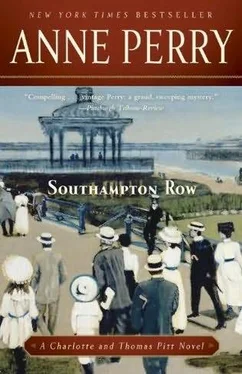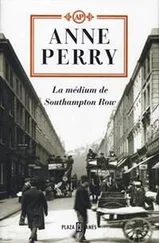Anne Perry - Southampton Row
Здесь есть возможность читать онлайн «Anne Perry - Southampton Row» весь текст электронной книги совершенно бесплатно (целиком полную версию без сокращений). В некоторых случаях можно слушать аудио, скачать через торрент в формате fb2 и присутствует краткое содержание. Жанр: Исторический детектив, на английском языке. Описание произведения, (предисловие) а так же отзывы посетителей доступны на портале библиотеки ЛибКат.
- Название:Southampton Row
- Автор:
- Жанр:
- Год:неизвестен
- ISBN:нет данных
- Рейтинг книги:5 / 5. Голосов: 1
-
Избранное:Добавить в избранное
- Отзывы:
-
Ваша оценка:
- 100
- 1
- 2
- 3
- 4
- 5
Southampton Row: краткое содержание, описание и аннотация
Предлагаем к чтению аннотацию, описание, краткое содержание или предисловие (зависит от того, что написал сам автор книги «Southampton Row»). Если вы не нашли необходимую информацию о книге — напишите в комментариях, мы постараемся отыскать её.
Southampton Row — читать онлайн бесплатно полную книгу (весь текст) целиком
Ниже представлен текст книги, разбитый по страницам. Система сохранения места последней прочитанной страницы, позволяет с удобством читать онлайн бесплатно книгу «Southampton Row», без необходимости каждый раз заново искать на чём Вы остановились. Поставьте закладку, и сможете в любой момент перейти на страницу, на которой закончили чтение.
Интервал:
Закладка:
By five o’clock Pitt knew the names of those backing Voisey’s candidacy, both publicly and privately, at least those of record. He also knew that the issues Voisey had espoused were the traditional mainstream Tory values of trade and Empire. It was obvious how these would appeal to the property owners, the manufacturers and shipping barons, but now the vote had extended to the ordinary man who possessed nothing more than his house or rented rooms worth above ten pounds a year, and surely they were natural supporters of trades unions, and so of the Liberal Party?
The fact that it seemed an impossible seat for Voisey to win worried Pitt far more than had he seen some opening, some weakness that could be exploited. It meant that the attack was coming from an angle he had no idea how to protect, and he did not even know where the vulnerability lay.
He made his way south of the river towards the docks and factories in the shadow of the London Bridge Railway Terminal, with the intention of joining the crowd of workers at the first of Voisey’s public speeches. He was intensely curious to see both how Voisey behaved and what kind of reception he would receive.
He stopped at one of the public houses and had a pork pie and a glass of cider, keeping his ear to the conversations at the tables around him. There was a good deal of laughter, but underneath it an unmistakably bitter note as well. He heard only one reference to the Irish, or the vexed question of Home Rule, and even that was treated half jokingly. But the matter of hours to the working day aroused hot feelings, and some considerable support for the Socialists, even though hardly anyone seemed to know the names of any of them. Certainly Pitt did not hear Sidney Webb or William Morris mentioned, nor the eloquent and vociferous playwright Shaw.
By seven o’clock he was standing in the open outside one of the factory gates, the gray, flat sides of the buildings soaring up into the smoke-filled air above him. The clang of machinery beat a steady rhythm in the distance, and the smell of coke fumes and acids caught his throat. Around him were five or six score men in uniform browns and grays, color worn out of the fabric, patched and repatched, frayed at the cuffs, worn at the elbows and knees. Many of them had cloth caps on, even though the evening was mild and, far more unusually, there was no chill blowing up from the river. The cap was habit, almost a part of identity.
Pitt passed unnoticed among them, his natural scruffiness a perfect disguise. He listened to their laughter, their rowdy, often cruel jokes, and heard the note of despair underneath. And the longer he listened the less could he imagine how Voisey, with his money, his privilege, his polished manner, and now his title as well, could win over a single one of them, let alone the bulk. Voisey stood for everything that oppressed them and which they perceived, correctly or not, to be exploiting their labor and stealing their rewards. It frightened him because he knew far better than to believe Voisey was a dreamer, trusting to any kind of luck.
The crowd was just beginning to get restive and speak of leaving, when a hansom, not a carriage, came to a stop about twenty yards away and Pitt saw the tall figure of Voisey get out and walk towards them. It gave Pitt an odd shiver of apprehension, as if even in all this crowd Voisey could see him and the hatred could burn across the air and find him.
“Come after all, ‘ave yer?” a voice called out, for a moment breaking the spell.
“Of course I have come!” Voisey called back, turning to face them, his head high, his expression half amused, Pitt invisible, one anonymous face among the hundred or so men. “You have votes, don’t you?”
Half a dozen men laughed.
“At least ’e in’t pretending as ’e gives a damn about us!” someone said a few yards to Pitt’s left. “I’d rather ’ave a bastard wot’s ’onest than one wot ain’t.”
Voisey walked over to the wagon which had been left as a makeshift platform, and with an easy movement climbed up into it.
There was a rustle of attention, but it was hostile, waiting for the opportunity to criticize, challenge and abuse. Voisey seemed to be alone, but Pitt noticed the two or three policemen standing well back, and half a dozen or more newly arrived men, all watching the crowd, burly men in quiet, drab clothing, but with a fluidity of movement and a restlessness quite unlike the weariness of the factory workers.
“You’ve come to look at me,” Voisey began, “because you are curious to see what I am going to say, and if I can come up with anything at all to justify your voting for me, and not for the Liberal candidate, Mr. Serracold, whose party has represented you as far back as you can remember. And perhaps you expect a little entertainment at my expense.”
There was a rumble of laughter and one or two catcalls.
“Well, what do you want from government?” Voisey asked, and before he could answer himself he was shouted down.
“Less taxes!” someone yelled, to accompanying jeers.
“Shorter hours! A decent working week, no longer than yours!”
More laughter, but sharp-edged, angry.
“Decent pay! ’Ouses wot don’t leak. Drains!”
“Good! So do I,” Voisey agreed, his voice carrying well in spite of the fact he did not seem to be raising it. “I would also like a job for every man who wants to work, and every woman, too. I’d like peace, good foreign trade, less crime, more certain justice, responsible police without corruption, cheap food, bread for everyone, clothes and boots for everyone. I’d like good weather as well, but. .”
The rest of his words were lost in a roar of laughter.
“But you wouldn’t believe me if I told you I could do that!” he finished.
“Don’t believe yer anyway!” a voice shouted back, to more jeers and calls of agreement.
Voisey smiled, but the angle of his body was stiff. “But you’re going to listen to me, because that’s what you’ve come for! You’re curious what I’m going to say, and you’re fair.”
This time there were no catcalls. Pitt could feel the difference in the air, as if a storm had passed by without breaking.
“Do most of you work in these factories?” Voisey waved his arm. “And these docks?”
There was a murmur of assent.
“Making goods to ship all over the world?” he went on.
Again the assent, and a slight impatience. They did not understand the reason why he asked. Pitt did, as if he had already heard the words.
“Clothes made from Egyptian cotton?” Voisey asked, his voice lifting, his eyes searching their faces, the language of their bodies, the boredom or the quickening of understanding. “Brocades from Persia and the old Silk Road east to China and India?” he continued. “Linen from Ireland? Timber from Africa, rubber from Burma. . I could go on and on. But you probably know the list as well as I do. They are the products of the Empire. That’s why we are the biggest trading nation in the world, why Britain rules the seas, a quarter of the earth speaks our language, and soldiers of the Queen guard the peace over land and sea in every quarter of the globe.”
This time the rising noise had a different note to it, pride and anger and curiosity. Several men stood a little straighter, shoulders square. Pitt shifted quickly out of Voisey’s line of sight.
Voisey shouted above them. “It isn’t just glory-it’s a roof over your heads and food on your table.”
“’Ow about a shorter working day?” a tall man with ginger hair called out.
“If we lose the Empire, who are you going to work for?” Voisey challenged him. “Who are you going to buy from, sell to?”
“Nobody’s going ter lose the Empire!” the ginger-haired man replied with scorn. “Even them Socialists in’t that daft!”
Читать дальшеИнтервал:
Закладка:
Похожие книги на «Southampton Row»
Представляем Вашему вниманию похожие книги на «Southampton Row» списком для выбора. Мы отобрали схожую по названию и смыслу литературу в надежде предоставить читателям больше вариантов отыскать новые, интересные, ещё непрочитанные произведения.
Обсуждение, отзывы о книге «Southampton Row» и просто собственные мнения читателей. Оставьте ваши комментарии, напишите, что Вы думаете о произведении, его смысле или главных героях. Укажите что конкретно понравилось, а что нет, и почему Вы так считаете.












